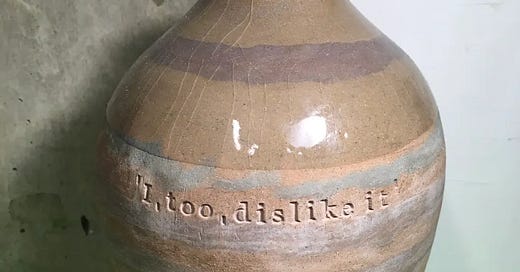
I didn’t post anything last week because I was, happily, too busy enjoying my day job: first, as the co-organiser of a one-day conference on poetry archives at the University of East Anglia, and then (same day, same place, same role) the public launch of the archive of the poet and translator, Sarah Maguire.
It was a warm, rewarding, exhausting day spent with people who were — to quote Marianne Moore — “interested in poetry”. It felt like all the best parts of my job combined. And it was so absorbing that I managed to put off reading an email.
The email was the first official confirmation from the university that they are looking to save money through job losses — 113 — this summer. The financial situation has been known about since January, making it an anxious year for everyone. We’ve already been through various other ways to save money, including a voluntary severance scheme and a (non-voluntary) pay freeze. Redundancy and redeployment in the areas affected comes next — and we don’t yet know where those are.
There has also been the option to reduce working hours, and that is something I’ve already taken. From August I will — I hope — be working 4 rather than 5 days a week. That will mean a change to how I’ve written this newsletter since it began in 2021: mostly over Friday lunchtimes, sometimes with a late Thursday night thrown in.
It’s always felt like part of my academic work, because I’ve written about things that have come out of teaching and researching poetry, with the aim of interesting readers in and beyond academia (the “real world” where I spend my evenings and weekends). But at the same time, it’s not something anyone has asked me to do as part of my job. So the change will be this: I’m going to spend my unpaid day working on Some Flowers Soon. And to do that, from August, I’m going to set up subscriptions.
I feel funny — peculiar — saying this. On the one hand, I’ve always earned some of my living from journalism, despite the general tendency of newspapers to put poetry’s column inches as near to the bins as possible. On the other hand, part of the fun of Some Flowers Soon has been its free nature — which is also an important part of my interest in poetry in general. As Audre Lorde observed, it’s the one art that “can be done between shifts, in the hospital pantry, on the subway, and on scraps of surplus paper”.
So I’ll still be writing free posts, though they won’t be the regular Friday posts. I’ll also be setting the monthly subscription as low as Substack — who take 10% — will allow (£3.50), with the annual subscription lower than that (£35). Free one-year subscriptions will be available to any student or short-term-contract academic who wants to send me their university email address — as well as anyone outside academia who is between jobs or otherwise without funds to lavish on poetry criticism.
In return, I’ll send out weekly posts continuing the general aims of this newsletter: to think about poetry in the world, to notice new poetry books, and to write about poetry as something that matters — as an art form with both a history and a future.
With two months to go, I’m still thinking about how to develop the focus of these regular posts. So I’d be very grateful if you could take a few seconds to vote in the following poll (“just go on your nerve” — Frank O’Hara). If you were a subscriber to Some Flowers Soon, what would you be interested to read about on a regular basis?
As the button below always says, thanks for reading Some Flowers Soon. If you have more thoughts on the poll above, do send me an email.
NOTES
You can read more about our poetry archive project at the University of East Anglia here: https://www.uea.ac.uk/web/library/british-archive-for-contemporary-writing/collections-a-z/centre-for-contemporary-poetry
You can find the catalogue for the Sarah Maguire archive at UEA here — visitors welcome, by appointment: https://archivecollections.uea.ac.uk/sma
You can read more about the situation at UEA here: https://thenorwichradical.com/2023/04/28/lose-30-million-uea-crisis-david-richardson/
My first post for Some Flowers Soon, on poetry criticism and print media:
Farewell, Anglia Auto Trader
My first regular gig as a poetry critic came in 2002 when the Guardian launched the Review: a spacious Saturday supplement, dedicated to books. I had published reviews here and there, but now I was o…




